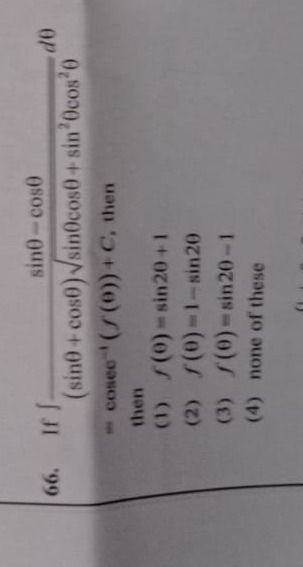Question
Question: If $\int \frac{sin\theta - cos\theta}{(sin\theta + cos\theta)\sqrt{sin\theta cos\theta + sin^2\theta...
If ∫(sinθ+cosθ)sinθcosθ+sin2θcos2θsinθ−cosθdθ=cosec−1(f(θ))+C, then

f(0)=sin2θ+1
f(0)=1−sin2θ
f(0)=sin2θ−1
none of these
f(0) = sin2θ + 1
Solution
To solve the integral I=∫(sinθ+cosθ)sinθcosθ+sin2θcos2θsinθ−cosθdθ, we use a substitution.
Let t=sinθ+cosθ.
Differentiating t with respect to θ:
dt=(cosθ−sinθ)dθ
So, (sinθ−cosθ)dθ=−dt.
Next, we express sinθcosθ in terms of t:
t2=(sinθ+cosθ)2=sin2θ+cos2θ+2sinθcosθ
t2=1+2sinθcosθ
sinθcosθ=2t2−1.
Now, substitute these into the expression under the square root in the denominator:
sinθcosθ+sin2θcos2θ=sinθcosθ(1+sinθcosθ)
Substitute sinθcosθ=2t2−1:
=2t2−1(1+2t2−1)
=2t2−1(22+t2−1)
=2t2−1(2t2+1)
=4(t2−1)(t2+1)
=4t4−1.
So the integral becomes:
I=∫t4t4−1−dt
I=∫t2t4−1−dt
I=∫tt4−1−2dt.
To evaluate this integral, let u=t2.
Then du=2tdt.
So, dt=2tdu.
Substitute u and dt into the integral:
I=∫tu2−1−22tdu
I=∫t2u2−1−du
Since t2=u, we have:
I=∫uu2−1−du.
This is a standard integral form. We know that ∫xx2−a2dx=a1sec−1(ax)+C.
Here, a=1.
So, I=−sec−1(u)+C.
Now, substitute back u=t2:
I=−sec−1(t2)+C.
Finally, substitute back t=sinθ+cosθ:
t2=(sinθ+cosθ)2=sin2θ+cos2θ+2sinθcosθ=1+2sinθcosθ=1+sin2θ.
So, I=−sec−1(1+sin2θ)+C.
The problem states that I=csc−1(f(θ))+C.
We use the identity relating sec−1 and csc−1: For x≥1, sec−1(x)+csc−1(x)=2π.
Therefore, −sec−1(x)=csc−1(x)−2π.
Applying this to our integral:
I=csc−1(1+sin2θ)−2π+C.
Let C′=C−2π. Then:
I=csc−1(1+sin2θ)+C′.
Comparing this with the given form I=csc−1(f(θ))+C, we find:
f(θ)=1+sin2θ.
This matches option (1).
